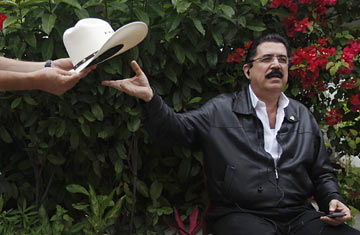
Ousted Honduran President Manuel Zelaya has his hat handed to him before a news conference inside the Brazilian embassy in Tegucigalpa
After months of delay, Arturo Valenzuela was finally confirmed as Assistant Secretary of State for Western Hemisphere Affairs last month. But for a job with such a long title, he may find it's short on clout these days. Ostensibly, Valenzuela is President Obama's new point man on Latin America; in reality, that job looks to be under the control of Republicans in Congress and conservatives inside Obama's own diplomatic corps. In fact, when it comes to U.S. policy in Latin America — as events this week in Honduras suggest — it's often hard to tell if George W. Bush isn't still President.
Granted, Latin America is on Obama's back burner as he tackles Afghanistan. But next year he plans to tackle immigration reform — an issue, like drug trafficking and free trade, that's heavily related to how well the U.S. helps Latin America build more equitble democratic institutions (the region has the world's worst gap between rich and poor). Yet as he ends his first year in office, Obama seems to have ceded Latin America strategy to right-wing Cold Warriors whose thinking — including the idea that coups are still an acceptable means of regime change — is no more equipped to help bring the region into the 21st century than the ideology of left-wing Marxists is.
That's been most apparent in Honduras, where the country's congress this week refused to reinstate democratically elected President Manuel Zelaya, a leftist who was ousted in a June 28 military coup. The Obama Administration condemned Zelaya's overthrow as an affront to Latin America's fledgling democracies. But conservatives led by GOP South Carolina Sen. Jim DeMint — who blocked Valenzuela's confirmation to protest Obama's stance — and Bush Administration holdovers such as the U.S.'s ambassador to the Organization of American States, Lewis Amselem (who was finally replaced this week), pushed Obama into brokering a deal in which the U.S. effectively condoned yet another armed putsch in the region. In an about-face, Obama recognized last Sunday's presidential election in Honduras, even though almost every other government in the world didn't because they consider the current regime there illegitimate. (The incoming Honduran president will be Porfirio Lobo, a wealthy cattle rancher.)
U.S. officials had been optimistic that even if the Honduran Congress refused to restore Zelaya before last Sunday's election, it would at least vote after the election to let him finish the remaining two months of his term. It would be a good-faith sign that the country was returning to constitutional order. Instead the legislators, emboldened by the success of the coup, poked both Obama and constitutional order in the eye again this week. Coup-happy forces in other Latin American countries can only feel emboldened as well.
The Honduras debacle is just the latest example of Obama's actions failing his words in Latin America. He wowed the Summit of the Americas in Trinidad last spring with soaring pledges to drop Washington's heavy-handed double standards in the region. He won kudos for acknowledging that the drug war is as much about U.S. consumption as it is about Latin corruption. But the cheers have since turned to chagrin on numerous fronts. Obama is loath to offend supporters of the U.S. trade embargo against Cuba; yet even Latin leaders who scorn the Castros shake their heads at Obama's insistence on retaining that utterly failed and globally rebuked policy — a position he holds despite polls that show a majority of Cuban-Americans now favor letting U.S. citizens travel to the communist island, and which suggest they're also weary of the 47-year-old embargo.
In South America, meanwhile, Obama has turned what should have been a routine transfer of U.S. anti-drug operations into a diplomatic row. By not consulting the continent's leaders about U.S. plans to use Colombian military bases not just for drug interdiction but also counter-insurgency work, which could theoretically spill over Colombia's borders, he needlessly revived deep-seated fears of yanqui military interventionism south of the border and raised the hackles of U.S. allies like Brazil and Chile. It was the kind of dismissive display that Bush was best known for in Latin America — and a gift to the anti-U.S. Latin left, whose leader, Venezuelan President Hugo Chávez, is galvanizing his political base at home in a difficult economy by hollering about an imminent U.S. invasion.
One of the U.S.'s more tiresome habits in Latin America is over-emphasizing elections as a political panacea. A transparent vote is of course a good thing — but for too long the U.S. has given Latin countries the impression that it's the only thing, muffling the harder message that real democracy is what happens after elections. Critics may call Chávez an authoritarian Castro wannabe. Yet he's remained in power for 10 years, and may well last another 10, in part because he's exploited Washington's election obsession. He's been cleanly voted in three times and that's helped him retain a democratic legitimacy despite his hegemonic power inside Venezuela. Valenzuela insists that the recent Honduran election doesn't whitewash the coup; but Amselem recently told the OAS he thought it would. Now, by recognizing its results, after earlier warning that he wouldn't, Obama has essentially accepted Amselem's dubious principle.
Valenzuela, one of the U.S.'s most esteemed experts on Latin America, was "disappointed" by the Honduran Congress' decision not to let Zelaya finish out his term. "The status quo," he said, "remains unacceptable." But it's a status quo Obama let the Cold Warriors keep intact — and it's now up to Valenzuela to wrest Latin America policy back from them.
